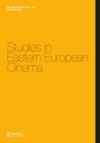The politics of a rock ‘n’ road docudrama—genre and intertextuality in Želimir Žilnik’s Oldtimer (1989)
IF 0.4
0 FILM, RADIO, TELEVISION
引用次数: 0
Abstract
Abstract This article examines Želimir Žilnik’s telefilm Stara mašina/Oldtimer (1989) as an example of the politically engaged use of genre and intertextuality in televisual representation. As a road movie, Oldtimer highlights how the journey trope imbued visual representations of movement with ideological and political meanings. At the same time, the film exposes the nationalist motivations behind the so-called anti-bureaucratic revolution in Serbia in 1988 and emphasizes television news department staff’s complicity in concealing them. This article argues that, by incorporating television news into its diegetic universe, the film displaced the content presented as informational into the realm of fiction. In this way, Oldtimer not only exposed this case of misinformation but modeled a critical approach to the consumption of television. The paper shows that Žilnik’s work contributed to the broadening of televisual potential for ideological signification, allowing the medium to function not simply as a propaganda instrument but as a space of contestation of different ideological positions. Žilnik’s choice to realize this project as a film for television shows the televisual capacity for self-awareness, and Oldtimer points to the medium’s potential to address the problems that political pressures create.摇滚和公路纪录片类型的政治与互文性在Želimir Žilnik的Oldtimer (1989)
本文以Želimir Žilnik的电视电影《Stara mašina/Oldtimer》(1989)为例,探讨了在电视表现中对类型和互文性的政治介入。作为一部公路电影,《老时光》强调了旅行的比喻如何将运动的视觉表现注入意识形态和政治意义。同时,影片揭露了1988年塞尔维亚所谓的反官僚革命背后的民族主义动机,并强调了电视新闻部工作人员在掩盖这些动机方面的共谋。本文认为,通过将电视新闻纳入其叙事世界,电影将作为信息呈现的内容取代为虚构的领域。通过这种方式,Oldtimer不仅揭露了这个错误信息的案例,而且为电视消费提供了一种批判性的方法。本文表明Žilnik的工作有助于拓宽电视意识形态意义的潜力,使媒体不仅可以作为宣传工具,还可以作为不同意识形态立场的争论空间。Žilnik选择将这个项目制作成电视电影,显示了电视自我意识的能力,而Oldtimer则指出了媒体解决政治压力造成的问题的潜力。
本文章由计算机程序翻译,如有差异,请以英文原文为准。
求助全文
约1分钟内获得全文
求助全文
来源期刊

Studies in Eastern European Cinema
Arts and Humanities-Visual Arts and Performing Arts
CiteScore
0.50
自引率
0.00%
发文量
34
 求助内容:
求助内容: 应助结果提醒方式:
应助结果提醒方式:


